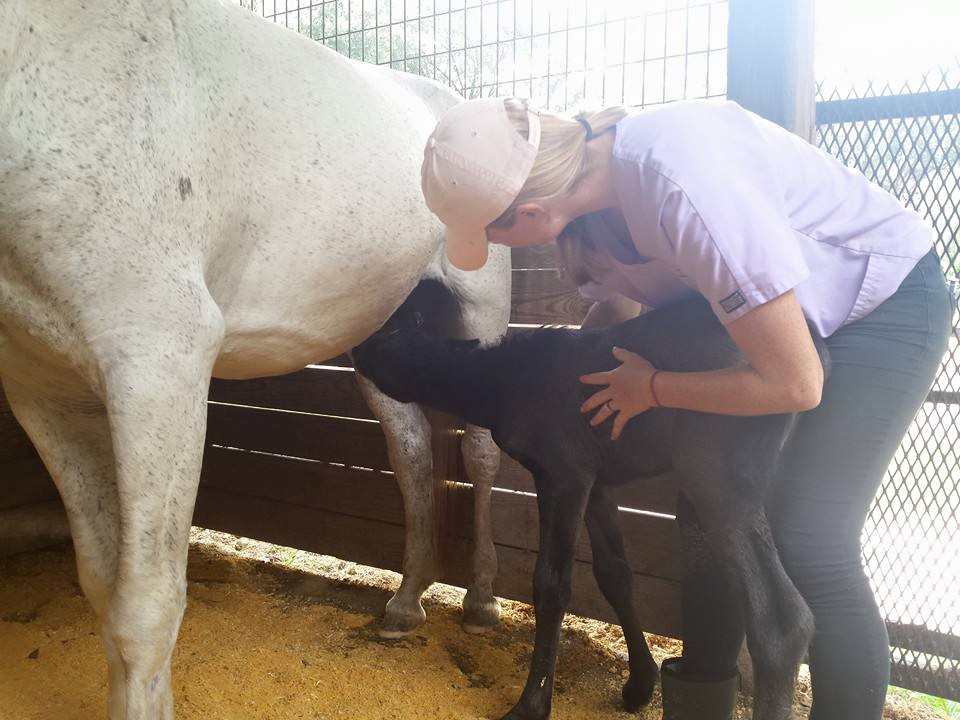Tuesdays with Tony
The Ins and Outs of Foaling Kits
It’s that time of year again, and everyone around the clinic has been buzzing with excitement about how new baby foals are about to hit the ground. Honestly, I don’t see why it’s so exciting. It’s not like a bunch of new kittens are about to be squirming about. But nonetheless, you’ve waited 11 long months for your bundle of joy to arrive. Luckily for you, I am here to help make sure you’re prepared for the long-awaited event. Before your foal arrives, it is important to have a foaling kit prepared with the essentials.
Contact Info
At the forefront of your foaling kit should be a list of my Docs phone numbers, especially our clinic’s emergency number, (352)-474-5007. It is also a good idea to have a list of phone numbers close by of those people you want present for the foaling. While you’re at it, you probably want to have a fully charged cellphone available so you can call my Docs as soon as you notice your mare showing signs of labor.
Lights and Clocks
While I tend to sleep 23 hours a day, for some reason, mares like to foal late at night/early in the morning. Hours of sleep wasted if you ask me, but because of this, it is important to have a good light source available. A flash light or head lamp will do nicely. Be sure you have a watch, clock, or stopwatch in your kit as well, so you can time each stage of labor.

Paper and Pen
If your mind isn’t quite as cat-like as mine and you’ve forgotten the correct interval times of each stage of labor, do not fear, just call the clinic and we will refresh your memory. Don’t forget when you call to have pen and paper ready to write things down, then you can just throw that pen and paper right into your foaling kit to have it available to write down the timings you take with your stopwatch when labor starts. Good moms take good notes!
Towels and Tail Wrap
You can never have too many clean towels. I like to lay on all the clean towels right when they come out of the dryer, ahhh so warm! Clean towels will come in handy after the foal is born, especially on a cool night to dry the little nugget off, but remember: let the mare do most of the cleaning and drying so she and her new foal have time to bond. If you catch your mare at the early stages of labor and you won’t disturb her, you may want to keep some vet wrap around and apply a loose tail wrap on her to prevent all those gooey birthing fluids from ruining her luscious locks.
String and Bucket
String, my favorite toy, it’s so much fun to chase around, is also an essential of any foaling kit. It has so many wonderful uses! You can tie up the placenta if the mare doesn’t pass it right away (we certainly don’t want her to step on it accidentally). Once the placenta has been passed, store it in a heavy-duty bucket with a lid or a strong plastic bag so that the Doctors can inspect it for any missing pieces. They must treat your mare right away if any part of the placenta is retained. An enema kit should be on hand in case your foal is having trouble getting things moving, but call my Docs before giving any kind of enema to your new baby!

Scissors
Sharp, blunt-tipped scissors or a sharp knife will be useful if you need to cut any string, or if the foal is having trouble getting its tiny little feet through the amniotic sac and you need to cut it away. Maybe they should be born with sharp claws like cats, then they wouldn’t have any trouble getting their feet out of the sac. But I digress.
Colostrum Plan
Your new baby will certainly need colostrum, have a plan in place with the Docs on what to do if the foal cannot get the necessary colostrum from its dam for some reason, as this will be the foal’s only source of immune boosting components necessary for it to develop a healthy immune system.
Antiseptic Dip
Last, but definitely not least, have some antiseptic dip. I recommend dilute chlorhexidine solution to dip your foal’s umbilical stump two to three times daily for the first three days of life. Dilute means 1 part chlorhexidine, 4 parts water. The umbilicus is an easy entry point for infection and should be kept clean and dry.
Plan B: Let Springhill Do It!
If all of this is just too much for you to bear, have no fear, the experts are here. Just call my staff at the clinic and ask them about our foal watch boarding where your mare will be under my watchful eye at all times (except when I’m sleeping of course). At the time of the big event, I will alert my Docs and they will be at your mare’s side for the entire process to ensure the safe arrival of your new bundle of joy.
More Info
It’s no coincidence that my docs have a podcast coming out on Feb. 15th (2019, in case you are reading this in the future) on foals. Dr. Hall, who is the foal expert down at Equine Medical Center of Ocala, joins the podcast for a deep dive into foals. It is packed full of need-to-know information! You can listen right on the website or subscribe to Straight from the Horse Doctor’s Mouth on Stitcher, Apple Podcasts, or wherever you get your podcasts.
Until next week,
~ Tony
Tuesdays with Tony is the official blog of Tony the Clinic Cat at Springhill Equine Veterinary Clinic in Newberry, Florida. If you liked this blog, please subscribe below, and share it with your friends on social media! For more information, please call us at (352) 472-1620, visit our website at SpringhillEquine.com, or follow us on Facebook!
[jetpack_subscription_form title="Subscribe to Whinny's Wisdoms"]
